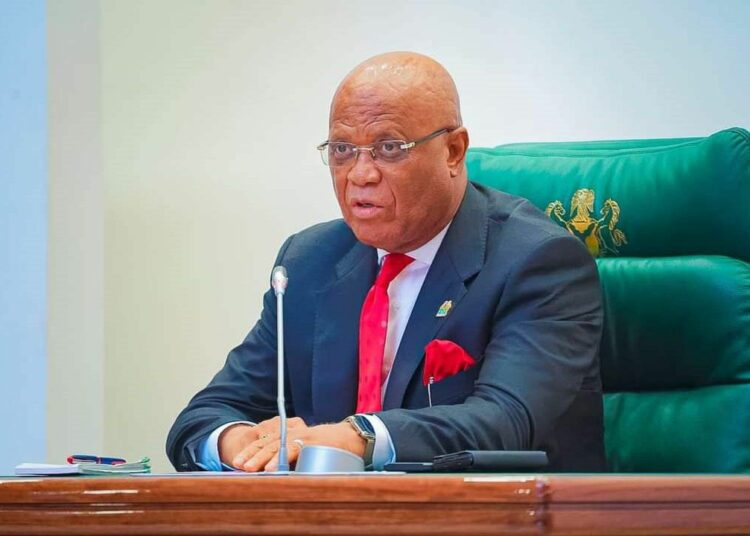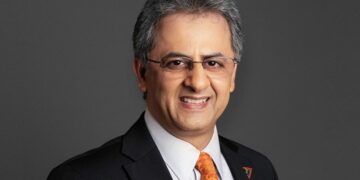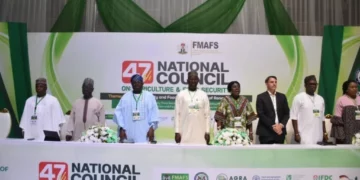Akwa Ibom State Governor, Pastor Umo Eno, and Chairman of the Senate Committee on Capital Market and Institutions, Senator Osita Izunaso, have called for a careful and balanced implementation of ongoing fiscal and financial reforms to sustain investor confidence, ensure inclusive growth, and strengthen the country’s economic foundation.
Both leaders made this statement while delivering their remarks at the Moneyline Investment Forum, held in Abuja, which focused on Nigeria’s evolving financial landscape, fiscal reforms, and the path to sustainable wealth creation.
The Commissioner of Information in the state, Aniekan Umanah, represented the Akwa Ibom state governor.
Similarly, Senator Izunaso expressed concern over the recent N4.64 trillion loss in market value recorded on the Nigerian Stock Exchange on Tuesday, following investors’ reaction to the proposed 30 per cent Capital Gains Tax (CGT) under the Nigerian Tax Act 2025, which is expected to take effect in January 2026.
He explained that the planned increase from 10 to 30 per cent on share transactions valued at N150 million and above has triggered widespread disposals by major investors, resulting in a sharp decline in market capitalisation.
“In anticipation of this change, we have observed significant disposals by major investors, resulting in a notable decline in market capitalisation,” he said. “While taxation is essential for revenue generation, it is equally critical that fiscal measures do not inadvertently undermine investor confidence or discourage long-term capital formation.”
Izunaso urged the Minister of Finance to explore mechanisms that would address investor concerns while ensuring that government revenue objectives are met without destabilising the capital market. “A balanced approach will sustain momentum, protect market stability, and preserve the positive trajectory our capital markets have achieved under current reforms,” he stated.
Governor Eno, who delivered the keynote address, stressed that fiscal reforms must ensure a strong synergy between government policy and the people, arguing that economic progress will only be meaningful when reforms translate into real benefits for citizens and businesses.
“To achieve sustainable progress, there must be synergy between policy and people, between fiscal reform and financial education, and between the boardroom and the marketplace,” he said.
While acknowledging the significance of the ongoing reforms — including the new Investment and Securities Act 2025, Insurance Industry Reform Act 2025, new tax laws, and power sector deregulation — the governor cautioned that reforms must be carefully managed to avoid unintended shocks.
“We must be mindful of the risks that accompany reform — market volatility, inflationary pressures, and global uncertainties. Yet, within these risks lie opportunities to reinvent governance, promote inclusive growth, and leverage technology to deepen financial inclusion,” Eno stated.
He said Akwa Ibom’s economic strategy, anchored on the ARISE Agenda, exemplifies how subnational governments can drive productivity, innovation, and enterprise to complement the Federal Government’s push for a $1 trillion economy by 2030.
“Akwa Ibom stands today as proof that growth and development are possible when vision meets discipline and when governance serves the people rather than political expediency,” he said. Eno reaffirmed his commitment to transparency, accountability, and peace — describing them as “the three currencies that attract sustainable investment.”
Izunaso also reaffirmed the Senate’s legislative commitment to strengthening market institutions through the Investment and Securities Act (ISA) 2025, describing it as a transformative legal framework designed to deepen participation and promote inclusivity in the Nigerian capital market.
“The ISA 2025 is not just a legal instrument; it is a roadmap for building a capital market that is inclusive, resilient, and globally competitive,” Izunaso noted. “It supports the Federal Government’s ambition of achieving a $1 trillion economy by 2030 and transforms our markets into engines of broad-based economic growth.”
Both leaders emphasised collaboration among government, regulators, and the private sector as essential to converting reforms into tangible results. They agreed that Nigeria’s future prosperity depends on aligning fiscal discipline with investor confidence — transforming policies into prosperity and reforms into results.





